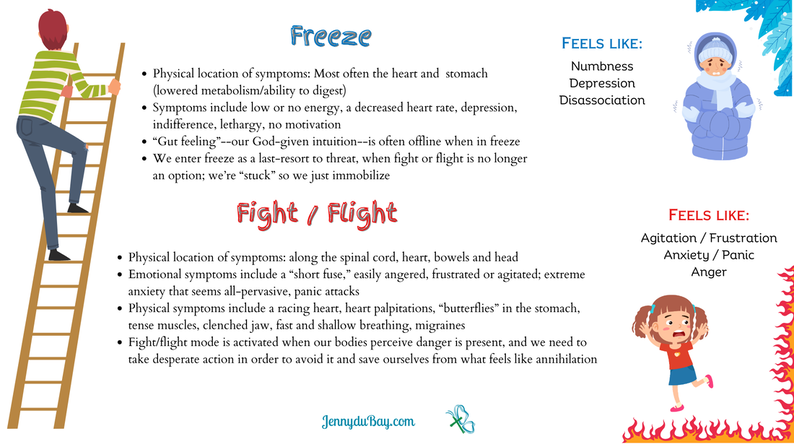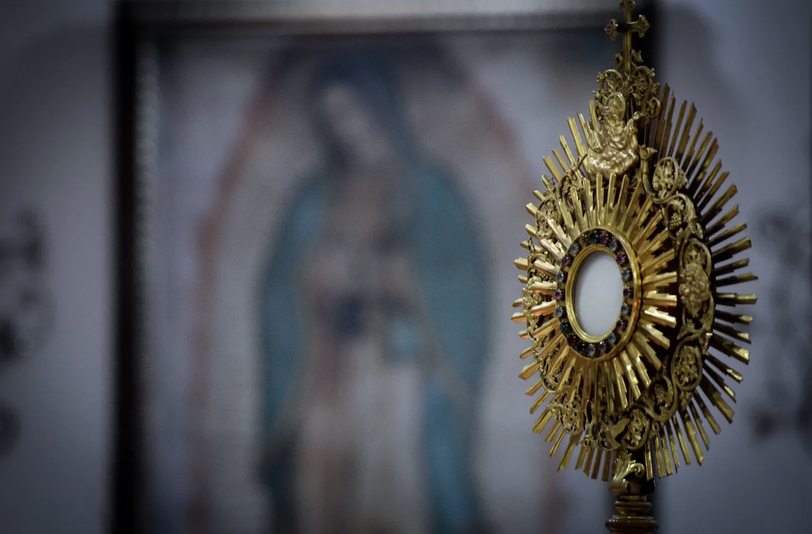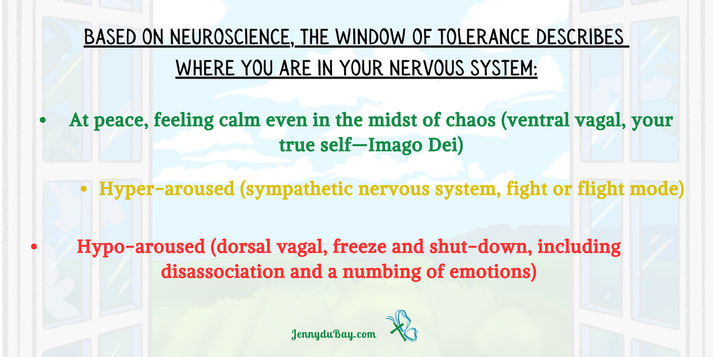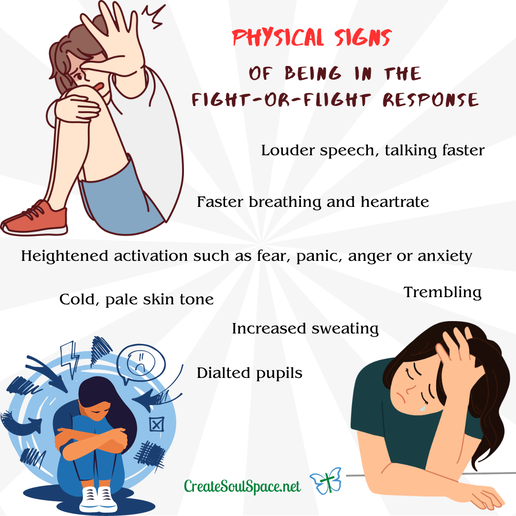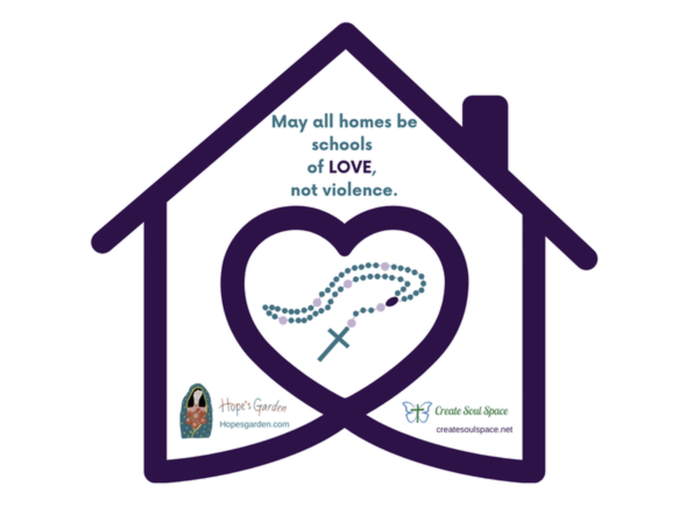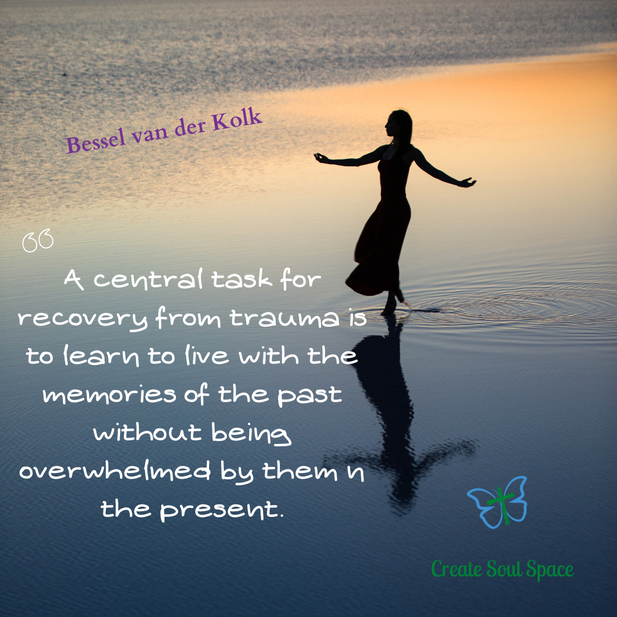|
After a multitude of requests for updates on the book project I’ve been working on, as well as recent suggestions from my clients, I’ve decided to offer Don’t Plant Your Seeds Among Thorns: A Catholic’s Guide on Domestic Abuse to all paid subscribers of my Substack blog. Topics covered in my book include:
And so much more!
0 Comments
Years ago, when one of my clients was describing the mistreatment she’d endured in her life, I gently yet curiously observed that she’d just narrated her account as if she’d been reading a newspaper article. This took her aback, yet she at once recognized the truth of my words. Matter-of-fact, very practical and without much emotion—that was indeed how she’d told her story. She also recognized why: not because the trauma hadn’t impacted her, but because it had been so severe her mind simply hadn’t been able to take it in, and her nervous system had been locked in a nearly perpetual freeze mode. Sure, it was a functional freeze—she’d still managed to keep up with daily chores and life obligations—yet she’d done so in an internally stilted state, unable to feel the compounded trauma because it was simply too much to bear. However, as a consequence she was also unable to feel joy, gratitude, happiness … And hope. Yet there’s one thing we all need to remember: Lack of hope leads to despair, and despair is the enemy of healing. How can we avoid this trap of despair? How is healing even possible?
Our Lady of Guadalupe’s Message for Today: Healing Hearts and Ending the Culture of Abuse12/12/2023 The latest article on my blog is by guest author Laura Ercolino, about the miraculous appearance of Our Lady in Guadalupe, and how the message is still so crucial today. She writes:
"Our Lady of Guadalupe is known as the Patroness of the Americas and of the Unborn. I believe that she is also asking to be a patroness of women who have been victims of marital abuse and sexual assault. Too many women sacrifice themselves—their hearts, bodies, identities, and dignity—because they erroneously believe God asks them to accept abuse, control, and acts of lust and depravity. The desecration of women, who are beautiful temples of the Holy Spirit, by means of pornography, sexual abuse, and domestic violence, is a form of human sacrifice in our age. Our God, the God Who Our Lady of Guadalupe revealed to the Aztecs 500 years ago, is a God of love and mercy. He sent His only Son, Jesus, to be the One True sacrifice. He does not require wives and mothers to sacrifice themselves to the men who vowed to love, cherish, and protect them. Addressing abuse in all its forms is crucial, for we were created by love, for love, not to harm one another or to be harmed. It is imperative to bring all forms of abuse to the light, including the hidden wounds within abusers themselves. The healing of hearts, marriages, and families is possible. Our Lady of Guadalupe serves as a messenger of hope to victims, assuring them that she and Jesus stand with them. Victims of sexual abuse and domestic violence are Mother Mary’s living Roses of Tepeyac. Enfolded in her mantle, they will bloom in unexpected places; redeemed, restored, and transformed into a beautiful bouquet for Christ, their Savior and Bridegroom." At its most basic level, anger is an internal response to protect oneself against feelings of terror, anxiety, grief, or shame. Core wounds such as “I’m not good enough” or “I’m unlovable” are often at the root of our experiences with anger. Lately I’ve received a number of emails focusing on a similar topic: anger as a response to trauma, and how to manage the emotion when it gets out of control. I’ve noticed a pattern to the messages I receive--and anger is a topic that comes up often this time of year, as the holidays fast approach. I suspect this is because the holidays tend to be very stressful for those in difficult relationships or who are recovering from trauma. Remaining in our “window of tolerance” can be particularly challenging during times of increased stress. If you need extra support during the holidays, please contact me for more information about joining my secure peer-to-peer support group for female survivors of intimate partner violence, hosted by Hope’s Garden. The window of tolerance is a concept originally developed by Dr. Dan Siegel to explain the sense of inner peace and calm within individuals—in other words, a regulated and balanced nervous system. This is the place where the Imago Dei—the true self, made in the image and likeness of God (Gen 1:26-27)—takes the primary role within a person. When we’re operating within our true selves we can successfully cope with our emotions, no matter what those emotions may be.
However, for those of us who have suffered from trauma, it can be an immense challenge to remain in our window of tolerance, and we often enter a state of hyper-arousal (fight/flight), or hypo-arousal (freeze). “See, I told you that you’re the abusive one. And you just proved it!” Have you ever heard those words from your partner? Have you been tempted to doubt yourself and believe them, even if in your deepest heart—perhaps a place you can no longer reach—you know those words aren’t true?
If you’re in a toxic relationship, rotating around and around on the dreadful abuse cycle, you may have sometimes reached your breaking point where the “fight” part of your reaction system took over. Perhaps you just couldn’t take it any longer. Your body felt like it couldn’t handle another second of mistreatment, and your mind had already become so confused and chaotic it was difficult to be inside your own head. Because of the extreme stress you may have shouted back at your partner, called him regrettable names, even slapped or kicked him in an effort to … well, to just make it all stop! Afterward you likely felt shame, guilt and tremendous remorse for your actions, causing you to grovel an apology and wonder: Is he right? Am I the abusive one? There are four main attachment styes an individual can develop in childhood, which directly impact future intimate relationships. Those attachment styles are:
In this article I’ll be focusing on the disorganized attachment style, and how painful this inconsistent dynamic is within the context of relationships.
October is a big month not only for the Church (it's the month of the Holy Rosary, the feast of the Miracle of the Sun, and Respect Life Month) but also for everyone. Domestic Violence Awareness Month is fast approaching! To prepare for the month of the Holy Rosary, Respect Life, and Domestic Violence Awareness, I've partnered with Laura Ercolino of Hope's Garden to create a Rosary Campaign to pray for peace in homes and restoration of hearts and families.
Participation is simple! We've created a digital packet of images you can share on social media, in your local bulletin, as flyers, and more. The ultimate goal is to get as many individuals and parishes as possible to pray a daily Rosary in the month of October for the intention of the healing of hearts, marriages, and families -- whatever form that healing may take. One of the things I’ve learned after years of working in the field of domestic abuse recovery may seem surprising to many people: Although individuals can admit they’re in a difficult relationship, they often don’t realize that what they’re experiencing isn’t ordinary martial challenges, but is intimate partner violence. This is especially true when the abuse is covert and there’s no physical violence present. However, “violence” doesn’t always take place on a physical level—as a matter of fact, aggression that’s sly and hidden tends to be more damaging than the overt, physical forms of violence. Why can it so difficult to tell the difference between normal marital discord and domestic abuse?
Every marriage has challenges, and every couple will get into disagreements from time to time—perhaps even frequently. Disagreements, even if they get out of hand, aren’t themselves a sign of abuse. The true markers of ordinary challenges versus coercive abuse can be seen in how those differences are handled and resolved, and whether or not mutual self-giving exists in the relationship. Situations of power-over—where one spouse attempts to dominate the other or consistently prove the other wrong—are both red flags. Remember, abuse is a pattern of behavior, not a one-time event. We typically call someone who uses abuse to control or manipulate others an abuser. I certainly have, in countless previous articles, but perhaps there’s a different way we can view these individuals, one that gives us a more charitable perspective as well as relieves some of our cognitive dissonance.
At the same time, we must always remember that there is no excuse for abuse,and those who use such tactics need to take full responsibility for their choices and actions. Part of my training to become an inner healing life coach has included the study of a therapeutic method called internal family systems (IFS). Developed by Dr. Richard Schwartz, IFS suggests that within each of us are many sub-personalities or “families,” such as wounded parts, those parts of us that try to protect us from further hurt, and parts of us that we may not like. Although our primary self—made in the image and likeness of God—was created as a cohesive whole, we live in a fallen world. We get hurt, we hurt others; we develop addictions or traumas, we feel anxious or ashamed. Under the IFS model, we can now separate our core, primary self from our various sub-parts. For example, I’m not an anxious person at the core of my beinghood, but I do have an anxious part, a part that has tried to take over and run the show in an effort to alert me of the emotional danger I was enduring for so long. Now that I’m in a safe place, I no longer need that protector part to be so prominent; I only need her to step forward and alert me to real threats. Part of my own work in healing from trauma has been to create harmony within my nervous system by honoring that part, while integrating it to the background role it deserves—to come out only as a justified warning that something in my life is off-kilter. Yet how does this idea apply to someone who is abusive in their relationships? For the Q & A articles, I try to address questions I receive most often. Lately I’ve been getting emails from people asking about the various ways they can receive professional help as they navigate their situation. The questions usually go something like this:
"I’ve been having a difficult time finding a therapist who really understands my situation and is trained in domestic abuse. I also need someone who shares my morals and faith. I’m now thinking about finding a spiritual director instead of a therapist, or maybe a spiritual life coach. What’s the difference between a spiritual director, therapist, and a life coach?" As a spiritual director, certified wellness consultant, and a trauma-informed Catholic life coach, I’ll do my best to answer your questions. |
AuthorJenny duBay, Trauma-Informed Christian life coach specializing in healing from betrayal trauma and domestic abuse. |


